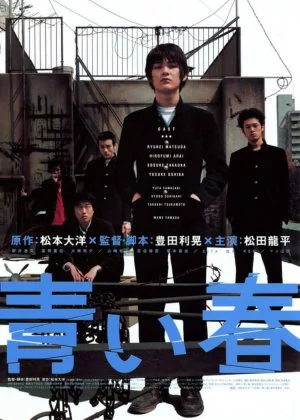Blue Spring
For young and ambitious Japanese directors, the turn of the century was an ideal time to work your way up. The momentum was strong, the budgets were there and the world was taking notice. Toshiaki Toyoda's Blue Spring [Aoi Haru] was the right film at the right time. A quirky, off-beat but emotionally strong coming of age drama that combined a unique Japanese niche with enough universal appeal to attract a broader audience. It's been at least a decade since I last watched it though, so I was looking forward to give Toyoda's early masterpiece another go.
![screen capture of Blue Spring [Aoi Haru]](/thumbs/img/articles/1200xauto/blue-spring-1.webp)
Blue Spring belongs to that particular niche of high school/crime hybrids that is quite specific to Japan. People familiar with the Crows Zero series or Chromartie High franchise will have little trouble familiarizing themselves with the Blue Spring universe, others might need some more time to get a feel for it. As introductions go though, I imagine Blue Spring is probably an ideal film to ease you in, as it doesn't let itself be restricted by its purest genre elements.
The entire film is set on the school premises, with all the action happening in and around the school halls, classrooms, toilets, playgrounds and rooftop hideaways, so there's really no escaping the unique setting. The gang-related antics play like a miniature Yakuza drama, with gangs roughing each other up and internal power struggles tearing up established gangs from the inside. Amidst all that exaggerated craziness lies a strong and pointed coming of age drama, which sets the film apart from its peers.
The film follows Kujo, a young and enigmatic but distant and something nihilistic kid who just seized leadership by claiming the "clap" record (a game played on top of the roof, where players hang over the side of the building and try to get in as many claps before grasping the railing). The problem is that Kujo isn't really interested in being a gang leader, so most of the gang-related stuff is delegated to Aoki, his right hand and longtime best friend. Other gangs are looking to crush Kujo's record though and Aoki isn't getting the respect he feels he deserves, which puts Kujo in a tough spot.
![screen capture of Blue Spring [Aoi Haru]](/thumbs/img/articles/1200xauto/blue-spring-2.webp)
Visually Blue Spring is a very dark and sullen-looking film. A muted color palette (even the cherry blossom trees don't pop) and monotone color choices make for a rather grim film. But it's not ugly or off-putting by any means. Toyoda's camera work and visual detail help to create a setting where the actions of the characters make sense and don't feel out of touch. Toyoda leaves enough room for visual poetry too, allowing the drama and coming of age elements to come into their own, without taking away from the rougher punk aesthetic.
Punk is also the keyword when talking about the soundtrack. It's not my favorite genre of music, far from it, but it fits the film like a glove. The punk sound encompasses the raw and unpolished youthfulness of its characters, it underlines their sometimes rough and violent behavior, but it also allows for a softer side to shimmer through. It's another perfect example that a good score has little to do with the actual music, but more with the way it supports and even enhances the film.
The casting too is top-notch. Blue Spring is Ryuhei Matsuda's defining film (more so than Taboo) and it's easy to see why. His performance is enigmatic, channeling emotional depth and nihilistic shallowness at the same time. It's not as if the film rests on his shoulders alone, but he does give it a strong and meaningful boost. Hirofumi Arai and Mame Yamada also put in a great effort, just like the rest of the secondary cast, but every single one of them is overshadowed by Matsuda.
![screen capture of Blue Spring [Aoi Haru]](/thumbs/img/articles/1200xauto/blue-spring-3.webp)
Blue Spring may not hold too many surprises on a narrative level, the depth and appeal of Matsuda's character is something that gets me every time I watch the film. It would've been easy to hide behind the nihilistic traits of Kujo and call it a day, but Toyoda went for a subtle and almost inconspicuous shift in character that gives the entire film an extra dimension. It redirects the focus from cool and crazy genre effort to a somewhat more abstract but still moving coming of age drama.
Timing is everything and Toyoda, not your average, mainstream director, made the best of his situation. The market was looking intensely at Japan for new and exciting films and Toyoda delivered something that could appeal to both genre fans and broader film fans alike. Blue Spring is well-balanced, featuring a great cast, intriguing characters and a director with not only a clear vision, but also the ability to execute that vision flawlessly. It's one of the essential Japanese films of the early millennium, which still stands proud today. An easy recommend in other words.
